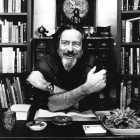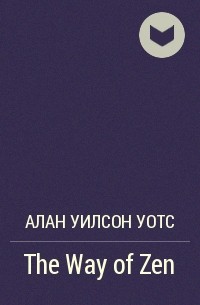
Автор
Алан Уилсон Уотс — библиография
- 24 произведения
- 40 изданий на 3 языках
Произведения
-
The Way of Zen Алан Уилсон Уотс
Дата написания: 2022 If we open our eyes and see clearly it becomes obvious that there is no other time than this instant
An insightful exploration into the origins and history of Zen Buddhism from pioneering Zen scholar Alan Watts. With a rare combination of freshness and lucidity, Watts explores the principles of Zen and how it can revolutionize our daily life. -
Мудрость Уязвимости Алан Уилсон УотсВ этой книге философ и писатель Алан Уотс показывает, как в нашу эпоху небывалой тревожности можно познать и принять силу настоящего момента, чтобы жить полноценной, счастливой жизнью. Проводя все время в тревогах о будущем и в сожалении о прошлом, мы забываем наслаждаться сегодняшним днем. Каждый, кто чувствует, что его жизненный курс нуждается в корректировке, найдет в «Мудрости уязвимости» прекрасный путеводитель.
-
Дух дзен-буддизма Алан Уилсон Уотс
Дата написания: 1936 Алан Уотс (1915—1973) – известный британский философ, писатель, лектор, один из самых выдающихся переводчиков и популяризатор восточной философии на Западе, написал более 25 книг. Уотс является учеником и последователем Дайсэцу Судзуки – японского буддолога, философа и психолога. После создания сыном Алана Марком Уотсом сайта alanwattspodcst.com в сети появились аудиозаписи Уотса, которые можно найти в том числе и на YouTube. «Дух дзен» – первая книга Уотса, написанная в 1936 году. В формате PDF A4 сохранен издательский макет.
-
Sencillamente as? Алан Уилсон УотсHe aqu? una inteligente invitaci?n a abrazar la lucidez, el placer y los v?nculos en nuestro mundo en constante evoluci?n. Las filosof?as espirituales orientales nos han introducido a nuevas formas de percibirnos a nosotros mismos, los misterios de lo real y el destino evolutivo de la humanidad.Con sus libros, charlas y programas de radio, Alan Watts se convirti? en uno de los pioneros de la divulgaci?n inteligente de dicha sabidur?a. A partir de una ya legendaria serie de seminarios, Sencillamente as? ilumina tres ?mbitos fascinantes de nuestras vidas: el dinero frente a la verdadera riqueza, la espiritualidad de un materialismo m?s profundo y c?mo la tecnolog?a y la espiritualidad nos pueden guiar hacia una mayor interconexi?n en el universo que habitamos.
-
El camino del Tao Алан Уилсон УотсInspir?ndose en los antiguos textos de Lao-tzu, Chuang-tzu, el libro de Kuan-tzu y el I Ching, as? como en los estudios de Joseph Needham, Lin Yutang y Arthur Waley -entre otros-, Alan Watts ha escrito, con su inimitable estilo, un libro destinado a convertirse en el texto occidental b?sico sobre el Tao?smo.El libro comienza con un cap?tulo acerca del lenguaje chino -que, seg?n Watts, pasar? a convertirse en el segundo idioma internacional despu?s del ingl?s-, para explicar, a continuaci?n, lo que significa el Tao (el fluir de la naturaleza), wu wei (la no-acci?n) y te (el poder que emana de ello). Cuando le sorprendi? la muerte, a fines de 1973, Watts se propon?a completar su obra escribiendo acerca de las implicaciones pol?ticas y tecnol?gicas del Tao?smo y sobre su significado actual. Aunque no pudo terminar el libro, un amigo y colega, el maestro de t'ai chi Al Chung-liang Huang -que asisti? y codirigi? las ?ltimas conferencias y seminarios que escribi? Watts, y que dieron pie al presente libro- complet? el texto y proporcion?, adem?s, muchas de las caligraf?as chinas que componen el material ilustrativo.El camino del Tao no es ?nicamente una introducci?n a la esencia del Tao?smo sino, en cierto modo, la opera magna que recapitula la vida y obra de Alan Watts.
-
The Two Hands of God Алан Уилсон УотсWill appeal to fans of Joseph Campbell and anyone interested in world mythology, particularly expressions of nonduality throughout the world’s spiritual traditions Watts’s lectures are frequent viral sensations on YouTube, often accompanied by animation and music Several Facebook groups host ongoing discussions of Watts’s work, collectively generating hundreds of thousands of likes from tens of thousands of members
-
Tao of Philosophy Алан Уилсон УотсThe Tao of Philosophy is a literary adaptation of talks selected to introduce the new «Love of Wisdom» series by Alan Watts to today's audiences.The following chapters provide rich examples of the way in which the philosophy of the Tao is as contemporary today as it was when it flourished in China thousands of years ago. Perhaps most significantly, these selections offer modern society a clearer understanding of what it will take for a successful reintegration of humans in nature.
-
Buddhism the Religion of No-Religion Алан Уилсон УотсThe widespread influence of Buddhism is due in part to the skill with which a way of liberation was refined by it's teachers and became accessible to people of diverse cultures. In this dynamic series of lectures, Alan Watts takes us on an exploration of Buddhism, from its roots in India to the explosion of interest in Zen and the Tibetan tradition in the West. Watts traces the Indian beginnings of Buddhism, delineates differences between Buddhism and other religions, looks at the radical methods of the Mahayan Buddhist, and reviews the Four Noble Truths and The Eightfold Path
-
Zen & the Beat Way Алан Уилсон УотсWhen Jack Karouac wrote about Zen in Dharma Bums he was echoing the sentiments of the Beat generation, who found in Zen credence for a way of life unencumbered by the limits of «square» society. And it was Alan Watts who first wrote and spoke about Zen and Eastern culture in terms accessible to mainstream Western audiences.Through his popular radio series Way Beyond the West Alan Watts brought listeners a delightful and practical side of Zen, which he prescribed as «a cure for education and culture.» By the early sixties his radio programs were renowned for their synthesis of Eastern wisdom and everyday life. Several of these radio talks have been selected and edited by Mark Watts, Alan's oldest son, to introduce a new generation to Zen and the Beat Way.Through this collection we see influences of D.T. Suzuki, C.G. Jung, Gary Snyder and others. Specific chapters discuss Zen influences on traditional Japanese and Chinese arts and explore the celebrated concept of the «controlled accident» within the rich tradition of Zen aesthetics. Also included is «Return to the Forest,» an essay that explores the works of Joseph Campbell on the earliest Beat tradition.
-
The Meaning of Happiness Алан Уилсон УотсDeep down, most people think that happiness comes from having or doing something. Here, in Alan Watts’s groundbreaking third book (originally published in 1940), he offers a more challenging thesis: authentic happiness comes from embracing life as a whole in all its contradictions and paradoxes, an attitude that Watts calls the “way of acceptance.” Drawing on Eastern philosophy, Western mysticism, and analytic psychology, Watts demonstrates that happiness comes from accepting both the outer world around us and the inner world inside us — the unconscious mind, with its irrational desires, lurking beyond the awareness of the ego. Although written early in his career, The Meaning of Happiness displays the hallmarks of his mature style: the crystal-clear writing, the homespun analogies, the dry wit, and the breadth of knowledge that made Alan Watts one of the most influential philosophers of his generation.
-
Psychotherapy East & West Алан Уилсон УотсBefore he became a counterculture hero, Alan Watts was known as an incisive scholar of Eastern and Western psychology and philosophy. In this 1961 classic, Watts demonstrates his deep understanding of both Western psychotherapy and the Eastern spiritual philosophies of Buddhism, Taoism, Vedanta, and Yoga. He examined the problem of humans in a seemingly hostile universe in ways that questioned the social norms and illusions that bind and constrict modern humans. Marking a groundbreaking synthesis, Watts asserted that the powerful insights of Freud and Jung, which had, indeed, brought psychiatry close to the edge of liberation, could, if melded with the hitherto secret wisdom of the Eastern traditions, free people from their battles with the self. When psychotherapy merely helps us adjust to social norms, Watts argued, it falls short of true liberation, while Eastern philosophy seeks our natural relation to the cosmos.



















